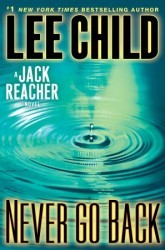
Perhaps I should change that to “Another Guilty Pleasure.”
Those of you who open my emails touting my latest nonsense on MillersTime know of my acknowledged addiction to the Boston Red Sox, even if you, wisely, avoid reading what I write about them.
There is a second addiction, which some of you may have discerned and I am willing to acknowledge here, and that is to Lee Child’s thrillers featuring his, and many of his readers’ obsession with, his hero Jack Reacher.
(This addiction, for which I blame and thank Elliott Trommald, is not as debilitating as the one to the Sox as Child has ‘only’ written 18 books while the Sox play 162 games every year. Plus, it only takes a few hours to read a Child’s book, and you’re pretty well assured of the outcome of his latest thriller even before you begin to read it. Not so with the Sox.)
All of the above is an introduction to Lee Child’s latest book, Never Go Back, and my attendance at a Lee Child’s book talk last night in DC.
First, the book:
It’s good.
The first 40 or 50 pages (it’s hard to tell about pages when reading electronically) are as good as Child’s best. Never Go Back opens with Reacher, in fact, going back to Washington, DC, where he’s spent a good deal of his ‘professional’ career and where he immediately gets himself thrown into jail.
The middle of the book slows a bit, and I found the ending (it’s not a spoiler to say Reacher wins again) a bit anti-climatic, tho there is some question about what will happen between Reacher and his female counterpart.
Is it Child’s best?
I don’t know.
In fact, that is both the good and bad about Child’s writing. It’s absorbing and a wonderful diversion to whatever else is going on in the reader’s life. And then it’s over, and I, for one, cannot remember or separate many of his earlier books from each other.
Someone said Child’s books are ‘candy for the brain.’ That sounds about right. Tho I’d add that they’re pretty high quality candy. And somewhat addictive too.
Since this is my year of ‘rereading,’ I think I might go back and reread at least one or two of his earlier ones to try to determine if there’s more to Child’s writing than admiring Jack Reacher and marveling at his ability to get himself into and out of messes and ‘Robin Hooding’ and ‘revenging’ his way around the country. (Any suggestions for my rereads from those of you who are Child/Reacher fans?)
Lee Child in person:

I’m not sure what I expected of this evening, other than hoping (against hope) that I would see Jack Reacher himself.
But despite not meeting Reacher, the evening was more enjoyable and more informative than most of the book talks I’ve attended.
First of all, as I’ve written elsewhere, he’s not Lee Child. That’s just the pen name British writer Jim Grant uses, tho I still haven’t learned why he needs an alias. And there was no reference to the name Grant at his appearance last night. Not sure what that’s all about.
Child did tell last night’s audience his naming of his main character Jack Reacher came from a comment from his wife, who said if his writing career did not work out, he could always become a ‘can reacher’ at the local supermarket because he was so tall. After working for 18 years in television, he had been fired in a ‘corporate restructuring.’ Out of a job at the age of 39, he decided to try his hand at writing, since, he said, “I’d read obsessively all my life, starting at the age of three, and I didn’t know what else to do.”
Now, 18 books later, one a year since his first one in 1997, Child says, “This is a great life, a great job, and I meet nice people. Plus, now that I’ve spent as much time writing as I did in television, I think I may never have to get another job.” He said he “had no work ethic, being a European” (tho he now lives in NYC) and thoroughly “loves the craft, art, and creativity of writing, even if sometimes I have to write as much as four or five hours a day.” He claimed he does no research, at least in the traditional sense, tho he stores experiences and observations which he uses in his writing and sees his whole life as research.
Asked how he came to his Jack Reacher character, Child said, “Being out of work and being unemployable, I knew I had to make this book work. I closed my eyes and wrote, and Reacher is what came out. He’s an amalgamation, inspired by things I’ve read (John D. MacDonald, for example). There’s a long tradition of loners in literature, individuals who are talented in a narrow range of things, idiots otherwise.”
Asked about the violence of Reacher, Child said, “Violence is how I feel. Everyone has a list of people you’d cheerfully shoot in the head but can’t. Reacher does it. It satisfies a primeval urge. You can do it in fiction, sort of a way to work out frustrations.”
For those of you who have not read any of Child’s books, know that even though his main character appears in all of them, each of his books stands alone, and you do not have to read them in any order.
For those of you who may be wondering how long Child/Grant will continue writing, he told the audience that at one point he thought he might stop with this book, Never Go Back. But in fact he recently signed a contract for another three books, and on September 1 (“I always start a new book on Sept. 1,” he said.) he began his 19th Jack Reacher book, which he’s tentatively titled 20 Seconds Ago.
Lee Child may not be Jack Reacher, but clearly he admires him, has some physical similarities to his ‘hero’ and from listening to Child talk, clearly he’s put some of himself into this character (his sense of time, his sense of humor, his feelings about violence, his view of the world, for starters). And Child/Grant is as every bit as likeable as is Reacher.
A good evening and a good introduction to the man who has been responsible for many hours of this ‘guilty pleasure’.

